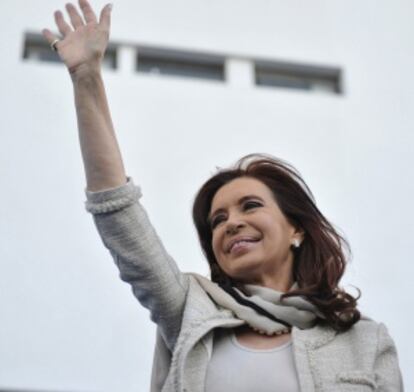Obama administration backs Argentina in ongoing dispute with creditors
Buenos Aires is protected by "sovereign immunity," deputy solicitor general tells US Supreme Court


Washington has sided with Argentina before the US Supreme Court in its dispute with a group of bondholders, which claims the government of President Cristina Fernández de Kirchner owes the investors $1.33 billion, after her country stopped making debt repayments in 2001.
During oral arguments before the nine justices on Monday, Deputy US Solicitor General Edwin Kneedler said the United States backed Argentina’s arguments that the Buenos Aires government is protected by US “sovereign immunity” clauses, which limits lawsuits filed against foreign nations.
The investors from NML Capital, who brought the suit against Argentina, are demanding an inventory of government property outside the country that can be subject to seizure. But Kneedler said the US government considers it privileged information because Argentina is protected by “sovereign immunity” clauses under US law. At the same time, the official told the court that many of Argentina’s assets are held outside his country’s jurisdiction.
The dispute began in 2001 when Argentina, struck by a severe financial crisis, stunned the world by announcing that it was suspending payments on its $80 billion debt. The following year, bondholders began filing lawsuits in the United States and other countries.
In 2005 and again in 2010, the government negotiated a major debt restructuring with its creditors, which allowed Argentina to issue new bonds at steep discounts. But about seven percent of the investors declined to negotiate.
Two years ago, a US federal judge ordered the Argentinean government to pay $1.3 billion to these creditors, which were led by the vulture fund NML Capital, or else risk the seizure of its international assets. The Fernández de Kirchner administration has appealed that ruling.
Some justices suggested that military and diplomatic assets should be off-limits to any type of seizure
On Monday, the nine Supreme Court justices heard arguments by lawyers representing NML, who are demanding that the private Bank of America and the Argentinean central bank give them a list of the country’s properties and holdings across the globe.
A federal appeals court had upheld a US District Court judge’s ruling that the Buenos Aires government must comply with their investors’ demands. As part of its appeal, Argentina claims that it cannot legally offer a better deal to the holdout investors, who want their money under the original terms, against those who agreed to the restructurings.
Some justices at the hearing on Monday suggested that military and diplomatic assets should be off-limits to any type of seizure.
Obama administration officials have said they are backing Argentina to stop the court from setting a dangerous precedent that could affect future debt-restructuring negotiations between private creditors and foreign nations where government property can be subjected to seizure.
Argentina also has the support of France, Mexico and Brazil, whose governments have filed briefs as friends of the court because they fear a negative ruling against Buenos Aires would also affect them.
The US Supreme Court is expected to issue a final ruling later this year.
Tu suscripción se está usando en otro dispositivo
¿Quieres añadir otro usuario a tu suscripción?
Si continúas leyendo en este dispositivo, no se podrá leer en el otro.
FlechaTu suscripción se está usando en otro dispositivo y solo puedes acceder a EL PAÍS desde un dispositivo a la vez.
Si quieres compartir tu cuenta, cambia tu suscripción a la modalidad Premium, así podrás añadir otro usuario. Cada uno accederá con su propia cuenta de email, lo que os permitirá personalizar vuestra experiencia en EL PAÍS.
¿Tienes una suscripción de empresa? Accede aquí para contratar más cuentas.
En el caso de no saber quién está usando tu cuenta, te recomendamos cambiar tu contraseña aquí.
Si decides continuar compartiendo tu cuenta, este mensaje se mostrará en tu dispositivo y en el de la otra persona que está usando tu cuenta de forma indefinida, afectando a tu experiencia de lectura. Puedes consultar aquí los términos y condiciones de la suscripción digital.








































